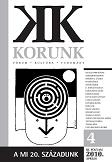20. századi magyar külpolitika
Twentieth-Century Hungarian Foreign Policy
Author(s): Pál PritzSubject(s): History
Published by: Korunk Baráti Társaság
Keywords: Austria–Hungary; World War I and II; revision; Hungarian Revolution; foreign policy
Summary/Abstract: After the Austro-Hungarian Compromise of 1867, Hungarians assumed the status of a partner nation, and their national interests have been taken into account in a realistic measure in the foreign policy of the Empire. Hungary’s involvement in World War I was not the result of national interest, yet it could not be avoided. The fall of St. Stephen’s empire was essentially brought about by the fact that the victorious Entente powers could no longer view the Austro-Hungarian Monarchy, and the Hungarian state within it, as a factor of balance in its relations with Germany, and have set out to create a new equilibrium at Hungary’s expense by way of the new independent states. The Hungarians’ tragedy was that, after losing the war, the national and the social project entered in sharp conflict, and finally they lost on both sides. The central inconsistency of Hungarian politics during the interbellum lies in a revision achieved in lack of their own forces, with the aid of the great foreign powers, which resulted in the loss of independency as a state. After 1945, there were many on the left who hoped for help from Moscow, yet it was instead in favour of punishment. The supporters of the bourgeois ways, on their turn, counted on western democracies as supporters of Hungarian interests, for whom these interests were of little importance in the wider context of the new bipolar world order. Although the Hungarian Revolution of 1956 had no chance to succeed, the heroes of this national uprising were the ones to have done the most for Hungary’s national interests. Its legacy triumphed in rendering Kádárist Hungary more liveable, and the change of regimes devoid of bloodshed. The two fundamental successes of the last two decades consist in Hungary’s admission in the NATO and in the European Union, and the future of this nation still depends in no small measure on the efficiency of its foreign policy, which also requires that the chasm between folk and nation narrows.
Journal: Korunk
- Issue Year: 2010
- Issue No: 04
- Page Range: 46-58
- Page Count: 13
- Language: Hungarian

